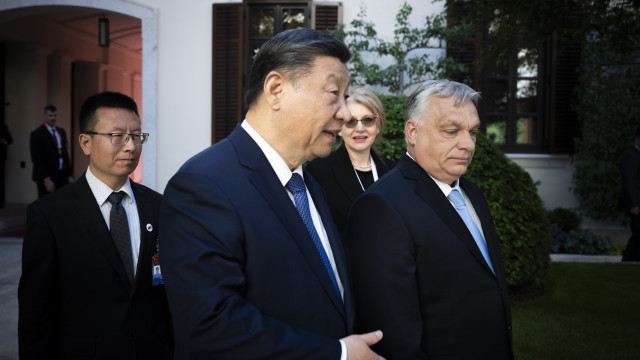During his visit to Budapest, Chinese President Xi Jinping pledged to deepen burgeoning economic ties with Hungary.
The president also advocated for his closest ally in the European Union to "play a bigger role" in promoting relations between Beijing and the bloc.
The state visit to Hungary is the latest leg of Xi's first European tour since 2019, which took him to France and Serbia earlier this week.
After his meeting with Hungarian Prime Minister Viktor Orban, Xi said Beijing attached "great importance" to its relations with the EU.
The Chinese leader urged Hungary, which takes over the bloc's rotating presidency in the second half of the year, to "play a bigger role in the EU and push for a new and greater development of China-EU relations."
Amid disagreements with the West over the war in Ukraine and world trade, the two leaders underlined their common views and demonstrated their close ties. They announced the signing of 18 bilateral agreements.
Budapest was decorated with Chinese flags for the state visit and placed under tight security. The few flags raised by Tibetan demonstrators were hidden from Xi's view.
Earlier on 9 May, Xi and his wife Peng Liyuan were received with military honors by Hungarian President Tamás Suljók in the glamorous courtyard of the Buda Presidential Palace in Budapest.
According to a statement released after the meeting, Xi said bilateral "relations are now at their best period in history".
Since he returned to power in 2010, Orban has been frequently at odds with Brussels and has pursued an eastward foreign policy, seeking closer economic ties with Russia, China and other Asian countries.
Hungary's nationalist prime minister has remained true to his strategy even as tensions have risen between Western countries and Beijing over human rights, the Kovid-19 pandemic, trade, and Russia's invasion of Ukraine.
Xi's three-day visit to Hungary after passing through Paris - the only other EU capital on the itinerary - "shows Hungary's growing importance in world politics", Orban's chief of staff Gergely Gulyás stressed.
Several new projects were announced on 9 May, including the construction of rail infrastructure, an oil pipeline between Hungary and Serbia and cooperation in the nuclear sector.
Since the 2022 Since Hungary began promoting itself as a global hub for electric vehicle production, battery and car factories have sprung up across the country, with tens of billions of euros invested.
While the government claims that Hungary is benefiting from its partnership with China, opposition parties have raised concerns about the lack of transparency, the environmental impact of battery factories and corruption.
The Chinese leader began his tour in France, a visit that was cordial but also highlighted tensions between Beijing and the EU over the war in Ukraine and world trade.
While French President Emmanuel Macron urged Beijing not to support Russia's war on Ukraine and to adopt fairer trade, Hungary provided "a friendlier destination for Xi," said political scientist Zhao Yan Chong of the University of Singapore.
In Hungary, a country with close ties to Moscow and Beijing, Xi was able to "avoid difficult talks and uncomfortable questions," he added.
Both sides called for a peaceful settlement of Russia's war in Ukraine.
Orban thanked China for its efforts "to promote peace and prosperity in the region," describing Hungary as a "lone voice in Europe."
"The visit to Hungary provides a diplomatic victory for Xi, showing his warm ties with an EU member state that is still rolling out the red carpet for Chinese investment," said Xiaoxue Martin, a researcher at the Klingendael China Center. / BGNES







